|
– Part 1: The Films (1932-1934) –
Despite only appearing in 12 films over the course of her career, Mae West was and remains an absolute legend. Forever identified with her most famous catch phrase, “Come up and see me some time,” she also gave birth to a slew of other memorable witticisms, most of which she delivered in films whose scripts she also penned. In an industry that was controlled and dominated by men, she was a rare example of a woman who called the shots, headlining films that she sometimes adapted from successful stage plays that she also wrote and starred in. It was she who shaped her distinctive screen persona, one that turned the popular notion of the amorous male who pursues a submissive and doting female completely on its head. In her films, West was a woman who radiated sensuality and sexuality, which she used to seduce any man she fancied, but who would also put up an effective resistance if one tried to force his affections on her. Everything about her screen image was erotically suggestive, from her entendre-peppered dialogue and saucy delivery to her body language and facial expressions. She also repeatedly presented herself as a woman so alluring that all men were uncontrollably drawn to her – if Mae took a shine to you, then resistance really was futile.
West was, however, a victim of unfortunate timing. After making a splash in a small role in her first film, Night After Night, she became a sensation in the two that followed, She Done Him Wrong and I’m No Angel, both of which she wrote and was the controlling force behind. Unfortunately for her, and ultimately for us too, she was pushing boundaries on the eve of the biggest moral clampdown in Hollywood history, as the restrictive Motion Picture Production Code was enforced by what became known as The Hays Office, which was in turn being pressured by uptight religious groups such as the comically named Catholic Legion of Decency. As a result, many of the very things that had made Mae West so popular with the public were effectively outlawed, clipping her artistic wings just as she was hitting the peak of her fame, and forcing her to tone down every aspect of a persona that relied on the open and free expression of her sensuality. This wasn’t her first battle with the censorial arm of the law. In 1926, she wrote, directed and starred in a Broadway play with the deliberately provocative title Sex, which ran for 375 performances before the theatre was raided by the police and West was brought up on obscenity charges, for which she served eight days of a ten-day stretch in jail. Apparently, she spent part of her sentence dining with the warden and his wife.
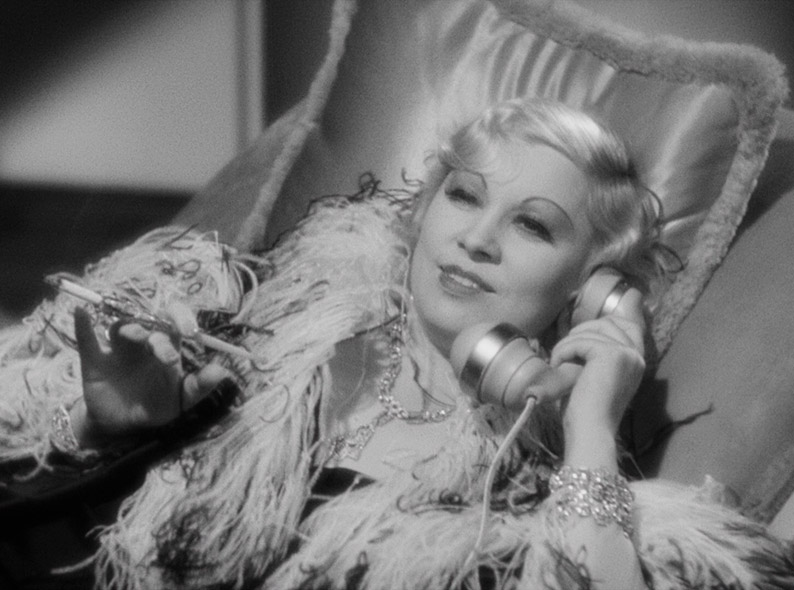
West’s post-Code films were thus all compromised in some way, but as she explored alternative storylines for her character and developed it in different ways, she still made movies that were entertaining and witty. Which of these work best for you will, as ever, be a matter of personal taste, and I have a feeling that most will favour some of these films over others and will disagree with my own preferences on this score. That said, I can’t see too many championing her final film in this set, The Heat’s On, for reasons I’ll outline in my coverage of that title. It was certainly the final straw for West, who didn’t make another film for 27 years and turned instead to performing in clubs and on stage, and to further upsetting the censors the radio. Her comeback role proved to be anything but when the 1970 Myra Breckenridge took a critical pasting and has since found its way onto a good many Worst Films list, though it has since become the subject of a small but devoted cult following. Her final film, the 1977 Sextette, was also considered a dud and was included on the list of The 100 Most Amusingly Bad Movies Ever Made in The Official Razzie Movie Guide.
None of which has ultimately dented West’s considerable legacy or lessened the appeal of her finest work. She’s almost always a joy to watch and to listen to, and her ability to make just about anything sound supremely fruity made her signature delivery and Brooklyn twang one of the most parodied in Hollywood history. Possibly my favourite tribute to her came in 1971, when the student body of University of California, Los Angeles voted her Woman of the Century, “in honour of her relevance as a pioneering advocate of sexual frankness and courageous crusader against censorship.”* It’s an appropriate award, given that West’s true legacy was not as a sex symbol, but a smart and boldly boundary-pushing symbol of genuine girl power. It’s this aspect of her personality that has seen her especially championed by women, something reflected in the fact that every one of those commenting on her and her work in the special features here is female.
This extraordinary box set from Indicator includes all ten of the films Mae West made during her heyday, and is backed by a packed boudoir of special features. As is often the way, this review has run late because I wanted to watch and write about every film and every extra in this collection, and that really has taken an age and runs for to over 15,000 words. I’ve thus spread it over three pages for convenience, with the films discussed below and on page 2, while have devoted the third page to the special features, the technical details, and some parting thoughts.
| |
“Goodness, what beautiful diamonds!”
“Goodness had nothing to do with it, dearie.” |
| Maudie responds to a remark by a speakeasy hat check girl |
Joe Anton (George Raft) is the owner of a successful New York speakeasy. At his side in every aspect of his life is the doggedly loyal Leo (Roscoe Karns), whilst pressuring him to sell up is mob-handed rival Frankie Guard (Bradley Page), who promises serious trouble if the unimpressed Joe refuses to play ball. Business is booming, and Joe is so popular with the ladies that he’s started dodging calls from former beau, Maudie Triplett (May West), and clearly finds the pushy Iris Dawn (Wynne Gibson) hard going. He’s instead become entranced by Jerry Healy (Constance Cummings), a beautiful young socialite who comes to the speakeasy and sits alone looking distractedly wistful. It turns out that she’s mulling over a marriage proposal from wealthy businessman, Dick Bolton (Louis Calhern), and when Joe finally finds an excuse to talk to her, she reveals that she used to live in this very building before it was sold and transformed into its current form.
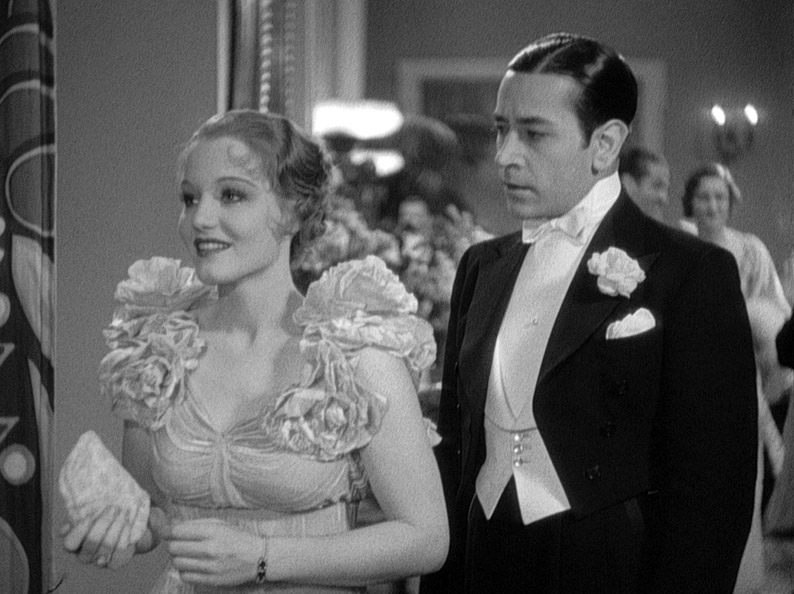
All the elements are there for a standard slice of 1930s fluffy entertainment, and the early scenes suggest that’s how Night After Night will play out, but signs soon start appearing that it might be a cut above the generic norm. For a start, we get to watch George Raft, who had only recently shot to fame as coin-tossing tough guy Rinaldo in gangster classic Scarface, play against type by going all gooey over a girl he’s never even spoken to and struggle to find the right words to impress her when he does. He may still play the tough guy with Frankie, but behind the scenes he’s taking elocution lessons from the matronly English Miss Mabel Jellyman (Alison Skipworth), who corrects him on his grammar and whom he seems eagerly keen to impress. As Joe’s good friend and second-in-command, Roscoe Karns plays Leo as an entertaining (if archetypal) blend of wise guy and cynic, and as Iris, Wynn Fibson is the sort of mouthy, pushy moll that was an entertaining regular in crime films of the day. What really impresses is the dialogue and delivery, with screenwriter Vincent Lawrence (with apparently uncredited contributions from Joseph L. Mankiewicz) really hitting his stride when Dick catches up with Jerry in the speakeasy and the two sit and discuss where their future might lead them. Constance Cummings is particularly well served here and takes every opportunity offered by the script to add a little something to her lines and further engage us with her character. It quickly became clear to me that while Raft was the headline star (check out the trailer in the special features for emphatic confirmation), it was Cummings who was going to carry the film. And then Mae West makes her delayed entrance and in a matter of seconds all but steals it from under her nose.
The first film in this set was also West’s first feature, and if you’ve ever wanted to see a star being born as soon as she walks appears then this is your movie. From the moment she breezes into the speakeasy and delivers the legendary and above-quoted line (which was also the title of West’s later autobiography), West is an absolute joy to watch, dominating every scene that she appears in, and by cutting a deal to rewrite her own dialogue, transforming Maudie into a vibrant and enticing symbol of life at its most unreservedly enjoyable. She’s the complete flipside of the furiously jealous Iris, not remotely fazed by Jerry’s presence and making firm friends with Mabel, getting her plastered and then offering her a job that will transform her life.
Plot-wise, there are precious few surprises ahead, with the expected barrier to true love raising its head for no other reason than to be overcome, even if this does involve Joe forcing himself on Jerry at one point and Jerry getting turned on by the threat of deadly violence. But it’s entertaining character-driven stuff nonetheless, and as a film made shortly before the Production Code started to really be enforced, it also has its fair share of risqué moments. A key dialogue exchange draws its humour from Mabel’s mistaken belief that a job offer from Maudie involves working as a prostitute, but there’s also a more fleeting but equally eyebrow-raising moment during a montage sequence, where the look that passes between two women as one of them offers the other a cigarette suggests that they are more than just good friends.
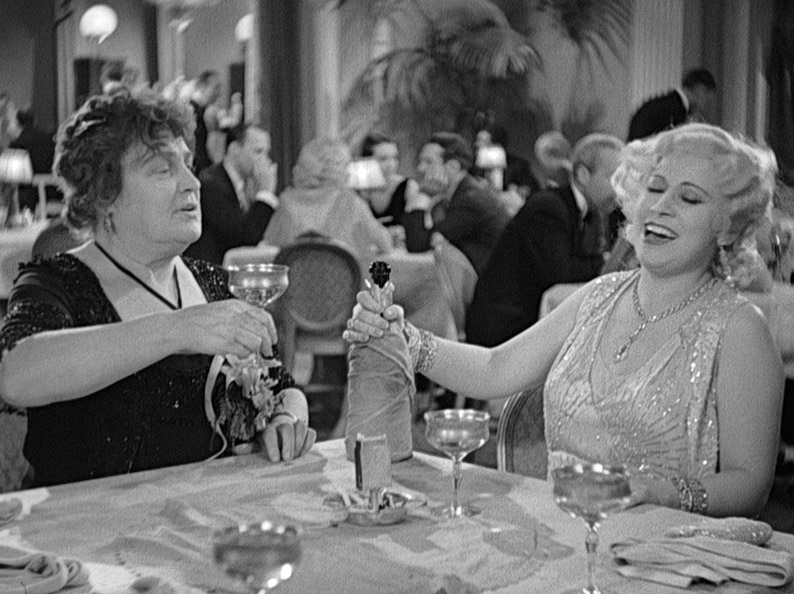
Despite being the only film in the set not headlined by West, Night After Night is still an enjoyable confection, for its cast, the chemistry of the leads, some snappy dialogue, and of course for West’s gloriously scene-stealing debut. There’s one last thing, and I’m going to blame Indicator’s Columbia Noir box sets for putting this notion in my head. As the opening title sequence rolls to an orchestral rendition of There’s No Place Like Home and a sign saying ‘Mansion for Sale’ is placed outside the building that will become Joe’s speakeasy, a small part of me expected the Three Stooges to buy the place and then completely wreck it during the course of an attempted refit and redecoration. I like to think that this occurred anyway and was cut out of the film and made instead into a standalone short, one that will appear on an as-yet unannounced fifth Columbia Noir collection.
| SHE DONE HIM WRONG (1933) |
|
| |
|
| |
“I always did like a man in a uniform. That one fits you grand. Why don't you come up some time and see me? I’m home every evening.” |
| |
Lady Lou to Christian Mission officer Captain Cummings |
It says a lot about the impact that Mae West must have made in her debut that her name is the only one that appears above the main title of her second feature, but also that it figures just as prominently as scriptwriter, with the names of collaborators Harvey F. Thew and John Bright sitting below in almost imperceptibly smaller type size. What is not stated here is that the film is an adaptation of the stage play Diamond Lil, which was also written by West and that was scandalous enough for the censors to forbid any mention of it here. Even at this early stage of her film career, West was starting to both take control of her projects and ruffle censorial feathers.
Long before Marylin Monroe claimed that diamonds are a girl’s best friend, West cast herself as Lady Lou, a popular singer in 1890s New York whose obsession with these sparkly jewels has seen her hook up with Gus Jordan (Noah Beery Sr.), the wealthy owner of a busy beer hall at which she performs. She’s given quite a build-up, with Lou and a large nude painting of her hung over the bar being a popular subject of discussion within the establishment, with man after man commenting on her beauty and longingly expressing the wish that she would take an interest in him. We’re nicely misdirected by a title sequence that presents her almost as a Gainsborough-painted aristocrat, but as soon as she arrives at the nightclub, the Mae West of legend is in full flow, as despite being officially partnered with Gus, she appears to be constantly on the lookout for potential new suitors. Immediately attracting her attention is Serge Stanieff (Gilbert Roland), the good-looking companion of a woman named Russian Rita (Rafaela Ottiano) and her partner in an as-yet unspecified criminal scheme masterminded by Gus behind Lou’s back. Making plans to put Gus out of business and step into his shoes with Lou, meanwhile, is his rival Dan Flynn (David Landau), and making a quietly judgemental pest of himself is Captain Cummings (Cary Grant), a uniformed officer from the Christian mission next door.
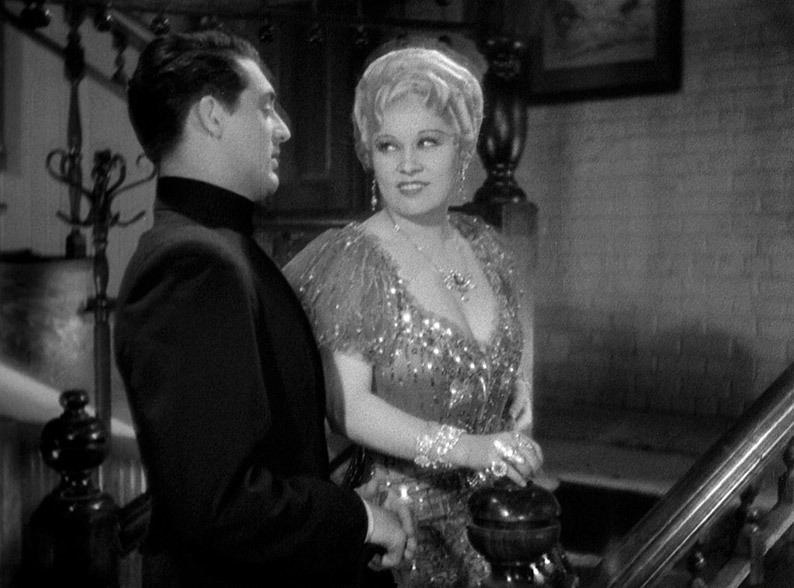
West was terrific in Night After Night, but in so many ways She Done Him Wrong is the first fully fledged Mae West film. She’s the star, the principal screenwriter, the source material author, and word has it that she all but took control of some elements of the filming from director Lowell Sherman. She casts herself as a woman that all men desire and gives herself the best lines, and also gets to sing three of the film’s five on-stage musical numbers. You can chalk this up to ego if you like, but West clearly understood her appeal and how best to market it, which bore fruit in the shape of $2 million in box office takings on a film that cost just $200,000, a success that was credited with saving the Paramount studio from bankruptcy.
Yet She Done Him Wrong proved to be so much more than just a vehicle for a rising star, being a work that entertains, intrigues and surprises in equal measure, more for what it dares to suggest as what it says outright. These were the early days of the Production Code, before the Hays Office really started putting its foot down but when it still had the power to enforce changes to the scripts and final edits of Hollywood movies. Thus, West was forbidden from specifying that Cummings was a Salvation Army Captain – even though from his uniform that’s clearly what he is – and was forced to change the sex trafficking ring operated by Gus and Russian Rita in Diamond Lil to a counterfeiting operation. Yet when the only unwary victim that we see them recruit is young, pretty, innocent and emotionally fragile Sally (Rochelle Hudson), I have a hard time buying into the idea that they see her as a perfect dirty money launderer. West also sprinkles her own dialogue with sexual innuendo, with the line quoted above (which was reworked in her next film into the more frequently quoted “Come up and see me sometime”) leading on to the even more suggestive, “Don’t be afraid, I won’t tell. Come up, I’ll, uh, tell your fortune. Ah, you can be had.” So much of why this hits home so deliciously is down to West’s insanely suggestive delivery, which could frankly transform even a grocery list into an fruity invitation to follow her to the boudoir and join her in the bath, and let’s not forget that this come-on is directed at what is essentially an officer in the Salvation Army. Despite the significant changes that the Hays Office forced on this adaptation of the play, I’m still genuinely astonished that so much of this got through. There’s also a later plot twist that I can’t reveal but that I suspect in later years would not have been allowed to play out and ultimately conclude as it does here. The times, they were definitely a-changing.
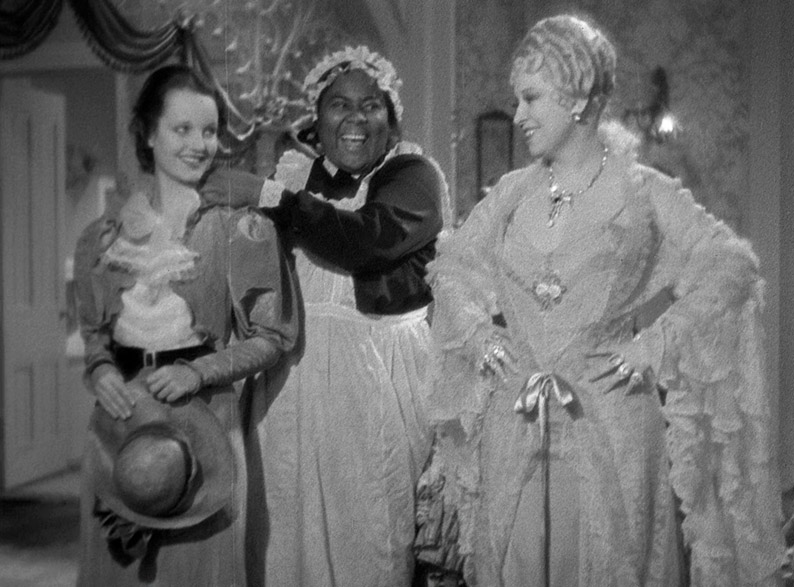
A couple of elements are defined by the era and have aged less well, the most prominent of which is Lou’s big and bubbly black maid, Pearl (Louise Beavers), whose “Well, here I is” dialect Lou mocks and whom she at one point refers to irritably as “eight ball.” Yikes. Yet for all that, the two women have an almost sisterly relationship, talking openly and honestly to each other about things we never see Lou discuss with anyone else. And watch West when she first enters her boudoir and calls for Pearl, and the delighted and friendly smile that she flashes when she sees her – as with so much of the film, there’s more going on here than the surface detail might suggest. This also goes for the character of Lou herself, as we’re a fair way into the first half of the film before it’s revealed that she also has a boyfriend named Chick Clark, a man who’s doing time for an unspecified crime and who she hasn’t visited since he was first banged up. She’s persuaded by her trusty bruiser of a friend Spider (Dewey Robinson) to pay him a visit, and in one of the few scenes not set on the beer hall premises, we’re given a few interesting hints about Lou’s past life and where the story might be heading next. When she first enters the jail, she seems to be on friendly terms with every prisoner whose cell she passes, but it’s when she visits Chick that we’re given a taste of a more serious direction that the film will later take. Creepily played – almost overplayed, but not quite – by Owen Moore, he spends a disturbingly large portion of their brief time together assuring Lou that if he finds out that she’s been with any other men while he’s been away then, as Lou surmises, “there’ll be a death in my family.” “Then I’ll be back in here again,” Chick notes with a disconcerting smile, “but you won’t be coming around to see me.”
She Done Him Wrong sees Mae West in charge and in full creative flow, and is one of the only two films in this set (see below) where she was able to have even close to free reign. It’s hugely enjoyable for its prickly wit, its suggestive dialogue, a typically charming performance from a young Cary Grant, and the radiant eroticism of its star. Put this on a double-bill with I’m No Angel, perhaps with Night After Night as an appetiser, and you’ll have no trouble at all understanding why West became the hugely successful icon that she did.
| |
|
| |
“When I’m good, I’m very good. But when I’m bad… I’m better.” |
| |
Tira to her latest suitor, Jack Clayton |
In her third feature and second as star and screenwriter, West plays Tira, an exotic dancer and singer at a circus sideshow, one that every male visitor to the show is shown clamouring to get a look at. Times have obviously changed, but alluring though West most definitely is, her dancing really isn’t up much at all, just a few gentle and almost effortless wiggles. Then again, the suspicion is that this is very much part Tira’s makeup, a low-effort show for an audience that would probably buy tickets even to watch her sleep, and whom she describes cynically as “suckers” as she exits the stage. She claims to be tired from tossing her hips when then asked to work the lions by her boss, Big Bill Barton (Edward Arnold), but after having her fortune told (“I see a man in your life” – “What, only one?”) by the circus astrologer, Rajah (Nigel De Brulier), she’s back in her trailer getting ready for a night out with audience member Ernest Brown (played by William B. Davidson and uncharitably listed in the credits as “The Chump”), whose subtle come-on she only responded to because he was wearing an obviously expensive diamond ring.
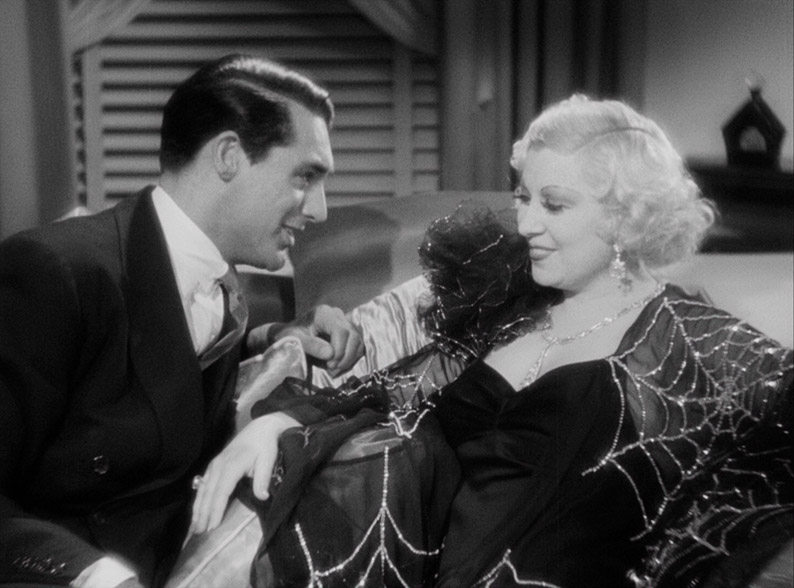
Before she heads out, Tora deflects her clingy part-time boyfriend, carnival pickpocket Slick Wiley (Ralf Harolde), and lends a helpful ear to depressed showgirl Thelma (Dorothy Peterson), even giving one of her necklaces to her to lift her sagging spirits. It’s here we get what feels like a cheeky bit of censor-baiting, as Tira opens a trunk in which she stores the gifts given to her by past boyfriends, all of whose pictures she has stuck on the inside lid. And there are loads of them. When we do get a close-up of one section, I have little doubt that the picture of a uniformed policemen sitting between two images of circus strongmen was put there to be seen and have meaning read into it by everyone watching.
Back at her apartment, Tira cheerfully dances around the overeager Brown’s attempts to seduce her, her interest in him focussed primarily on his presumed wealth. Her attempts to manipulate him are sharply scuppered when the jealous Slick bursts in and tries to blackmail Brown, then clubbing him cold with a whisky bottle after he makes moves to leave. Slick is soon arrested, and in need of some urgent cash to pay her old lawyer friend Benny Pinkowitz (Gregory Ratoff) to avoid jail time, Tira agrees to a crowd-drawing suggestion that she makes to Barton in the heat of the moment to stick her head in a lion’s mouth as part of the show. It proves to be a smash hit, and Tira is soon attracting the attentions of a slew of wealthy society men, notably Kirk Lawrence (Kent Taylor), who all but ignores his stuffy fiancée Alicia Hatton (Gertrude Michael) and spends his time instead buying expensive presents for Tira. Concerned that Kirk is being led astray and neglecting Alicia, his close and equally wealthy friend Jack Clayton (Cary Grant) pays Tira a visit in the hope of convincing her to back off, but neither are quite ready for the effect that they will have on each other.
West’s second film with Cary Grant keeps the new young star-to-be under wraps until after the halfway mark, but once Tira and Jack get together they make for a seductive couple, with Grant’s natural suave nicely balanced by West’s overt sexiness, which gives their romantic scenes a genuinely steamy undercurrent. Also carried over from She Done Him Wrong is the black maid – here named Beulah (Gertrude Howard) – who giggles at Tira’s every remark, but with whom she also has an almost sisterly bond and in whose company she seems most at ease. Jovial black maids and servants were unfortunately common in the Hollywood of the day and feature as status symbols of the characters played by West in several of her movies. Here they also become symbols of the rise of Tira’s social status and the expansion of her wealth. In the early scenes she attends to all of her own needs, only employing Beulah when she has widespread success and starts attracting society suitors. Later, once she’s being bought expensive gifts by Kirk and seemingly rolling in dosh, she is shown to have expanded her entourage of maids to four, one each to attend to her hands, feet, hair and clothing as she luxuriates on a chaise longue like a Egyptian queen at rest, yet a few screen seconds later she’s singing, dancing and laughing with two them like the best of friends. Beulah is also key to one of West’s most famous and wonderfully oddball lines, as she sends the visiting Alicia soundly on her way, then turns and walks cockily back towards her boudoir with the request, “Oh, Beulah. Peel me a grape.”
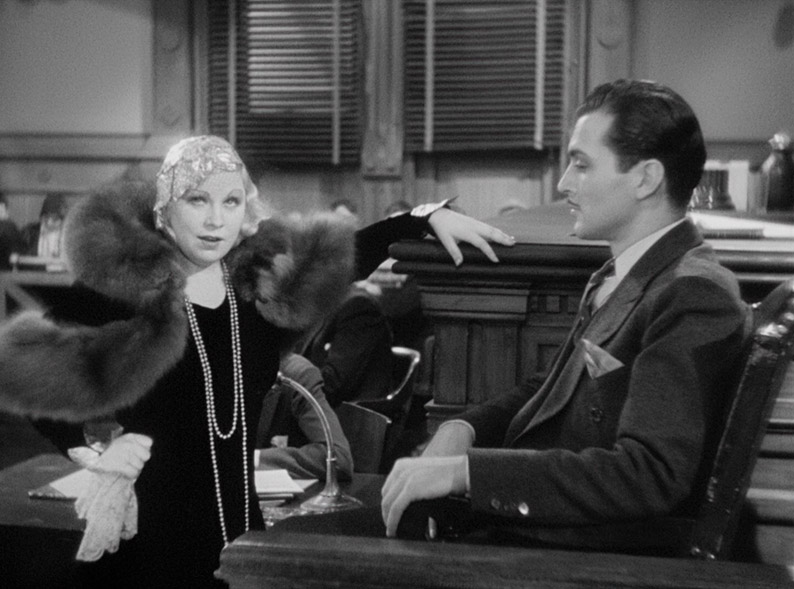
When some scheming on the part of Big Bill and Slick throws cold soup over Jack and Tira’s future plans, a talk with Benny lands the two of them in court. It’s a twist that is slyly foreshadowed by the roll call of actors in the opening titles, where the actor’s names are accompanied by brief clips of their characters in the film, and four of them are clearly sitting in a courtroom. It may seem like an uninspiring location for the climax to a movie like I’m No Angel, but it proves to be a riot, particularly once Tira starts to cross-examine witnesses, in the process outshining her own lawyer and working her charms on the judge, the jury members, and her opponent alike.
I’m No Angel is often cited as West’s finest film, and it’s hard to disagree, despite strong competition from its immediate predecessor. It’s hugely entertaining, West is a ball of fiery sensuality throughout, the supporting performances are a delight, and the dialogue really crackles. It’s the last time that West would have anything close to a free reign when it came to her character’s eroticism and suggestive dialogue, and while it’s for those aspects that this film is primarily remembered, there’s so much more evidence of West’s wit at work here. I particularly liked Tira’s habit of matching of pictures of the men in her life to figurines of animals that reflect aspects of their personality, and nearly snorted out my coffee when Big Bill tells her, “I’ve changed my mind,” and she replies almost offhandedly, “Yeah? Does it work any better?”
| BELLE OF THE NINETIES (1934) |
|
| |
|
| |
“Better to be looked over than overlooked.” |
| |
Ruth Carter |
And then came the Production Code. While the Code was first introduced in 1930, it did not start being rigidly enforced until 1934, shortly before the commencement of filming on West’s third starring vehicle, which was originally titled It Ain’t No Sin. When Paramount submitted the script to the Hays Office, as was by then a requirement for studio projects, the response was a hostile one: “The story, as we read it, is a vulgar and highly offensive yarn which is quite patently a glorification of prostitution and violent crime without any compensating moral values of any kind.”** Even the title was rejected, apparently because of what an audience might infer the word ‘It’ to mean in this context. The terror from beyond space, perhaps? Pennywise the clown? As a result, much of West’s trademark risqué dialogue was excised, and I’m presuming other alterations were enforced on the plot and the characters. Apparently, a Hays Office representation was even on set every day to make sure there were no transgressions. With that in mind…
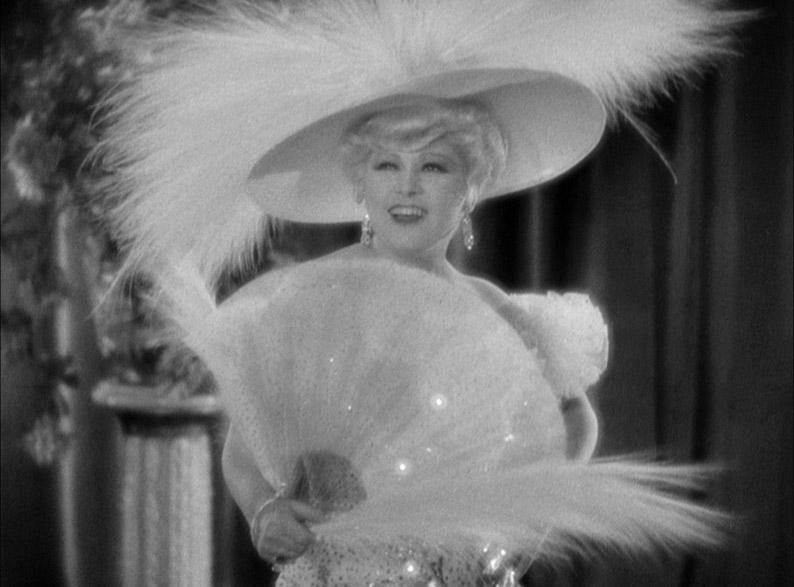
It’s the Gay Nineties again, and this time West plays Ruby Carter, a hugely popular nightclub performer whose act seems to consist of nothing more than standing on stage and looking glamorous while a singer does his stuff and the largely male audience wildly applaud Ruby’s every smile and change of pose. As an entertainment, its appeal is a little baffling, but I’m guessing the inference is that men find Ruth so utterly spellbinding that all she has to do is just pose for a minute or so in a range of showy costumes (how does she change that quickly?) and pocket her share of the evening’s takings. I’m surprised we didn’t get a repeat of the previous film’s “suckers” as she leaves the stage.
The first divergence from the West norm comes when we learn that Ruth is not the voracious manhunter of the previous films, but a one-man woman in a relationship with up-and-coming professional boxer, Tiger Kid (Roger Pryor). The problem is, the contentment this romance has brought to Tiger is making him lazy, so his manager Kirby (James Donlan) hatches a plan to convince him that Ruth is cheating on him, which prompts him to dump her and Ruth to relocate to New Orleans, taking a job as a singer at a nightclub owned by wealthy schemer, Ace Lamont (John Miljan). Once again, she’s soon pulling in the crowds, but also has to fight off amorous advances from Ace, who only seems to have booked her in the hope of being able to seduce her once she was in his employ, something that goes down like a lead balloon with Ace’s perennially pissed-off girlfriend Molly (Katherine DeMille). Then one day, Kirby brings Tiger to town, and Ace is so impressed with the young boxer’s skill (the short sequence in which his talent is demonstrated is rather funny) that he offers him a stab at the world championship title, a fight on which Ace plans to make a small fortune. What could possibly go wrong?
Despite initial suggestions to the contrary, there are some early signs that the persona with which West made her name is still bubbling beneath Ruth’s seemingly monogamous surface, notably in the pictures of her former boyfriends that Tiger stumbles across and which Ruth hastily conceals. This is stepped up a notch when Ruth steps off the boat in New Orleans, and one young man whose eye she catches returns a dropped glove with all the slavering hopefulness of a devoted dog. As Ruth thanks him, she eyes him up and down as if mentally planning what to do with him later, but curiously, he is never seen again.
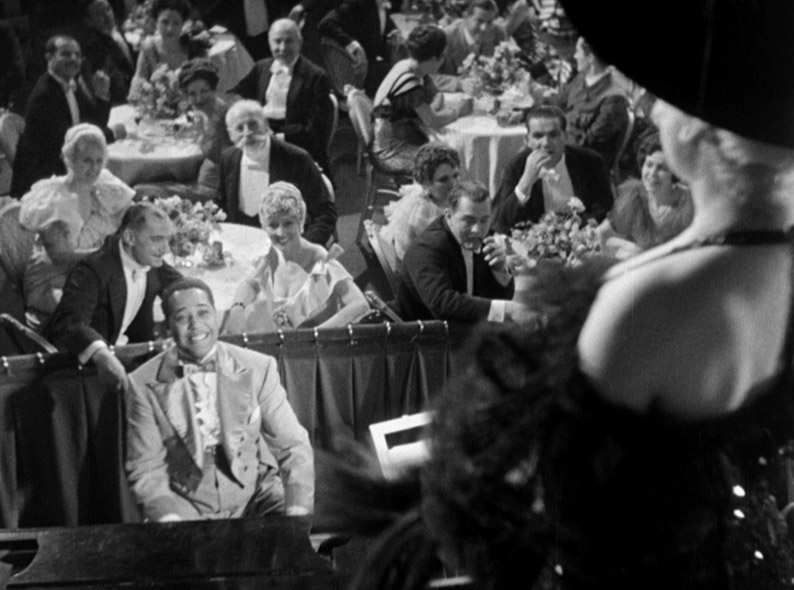
That she’s now in New Orleans and no longer tied to Tiger does build expectations that she’ll be back to her old ways, both as the Ruth that was hinted at by those pictures of past beaus and the persona with which West rose to fame and stole our hearts. Yet despite some signature sauciness on her part and a few minor innuendoes, Ruth feels a little like Mae West light, a watered-down version of her previous screen characters, one who still likes her men but who no longer goes fishing for anything rich and handsome in trousers, preferring instead to remain faithful to a boyfriend she’s a little more selective about hooking up with. Several of the previous signature Mae West elements are still in place, including a look and a body that suggests she’s hungry for sex, Ruth’s love of diamonds and expensive jewellery, some suggestive one-liners, and the jovial black maid who is amused by everything Ruby says and with whom she still often chats like old friends. Yet something has definitely been lost here. The dialogue lacks the spark of the previous films and none of those one-liners prompts even the smallest of disbelieving double takes. You can almost feel the presence of that Hays Office official, hovering in the background and shaking his stupid disapproving head every time West and her collaborators tried to push the envelope.
There’s still good stuff here. While I missed the sassy and sexually vibrant West of the earlier films in the opening scenes, there are also a couple of unexpectedly low-key moments where she hints at the more serious dramatic actor she would expand on in the later Klondike Annie. It’s solidly crafted by Duck Soup and Ruggles of the Red Gap director Leo McCarey, even if the story is disappointingly rocketed towards its moralist resolution by a pair of newspaper headlines instead of on-screen action, and the bluesy musical numbers are pretty darned good. Mind you, part of that is down to what may be the film’s strongest asset, with Ruth’s New Orleans support band played by none other than the great Duke Ellington and his Orchestra, whose involvement in the film was insisted on by – you’ve guessed it – Mae West.
next >>
The Films (Part 2) | Tech Specs, Special Features and Summary
|